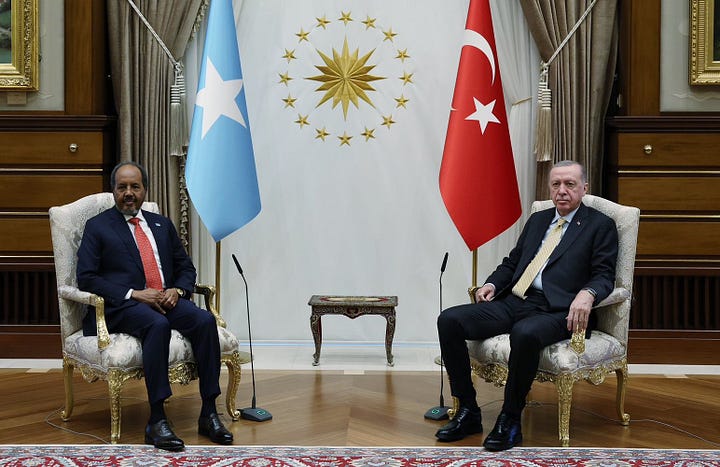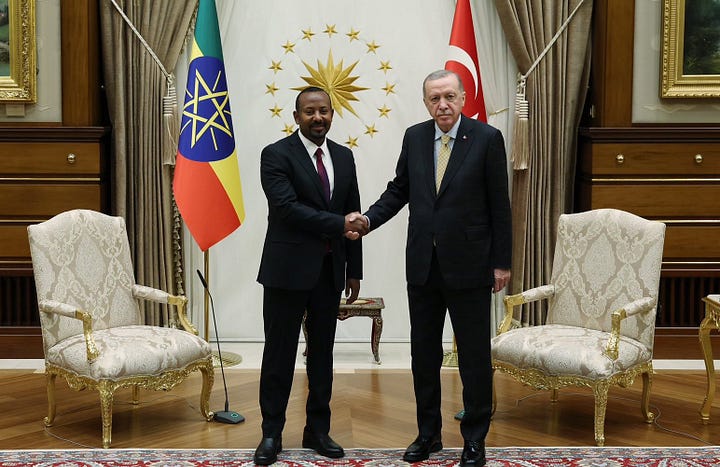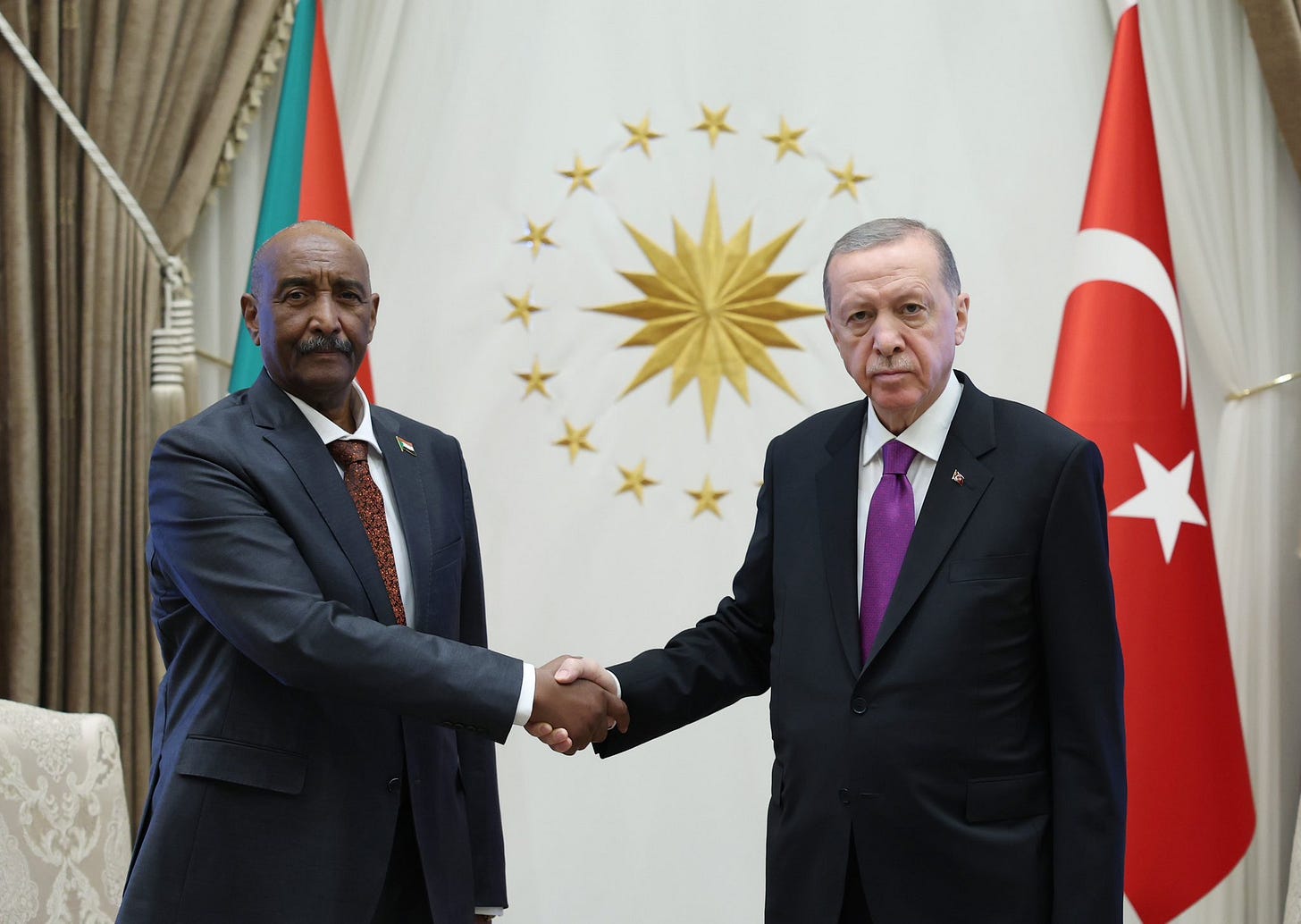Türkiye offers to mediate Sudan conflict
United Arab Emirates welcomes Turkish diplomatic initiative
The Republic of Türkiye (Turkey), led by President Recep Tayib Erdoğan, has offered to mediate in Sudan’s 20-month civil war, following unsuccessful mediation efforts by East African states, the United States, and Saudi Arabia.
Türkiye’s offer differs from previous mediation initiatives in one key respect: it is an offer to mediate between the Sudanese military government and the United Arab Emirates (UAE)—not between the military and the Rapid Support Forces (RSF).
In other words, Türkiye has framed the conflict principally as one between two sovereign states, Sudan and the UAE, rather than an internal conflict. This reflects the framing of the Sudanese military leadership, which often has spoken of the RSF militia as a ‘foreign’ proxy of the UAE and other powers.
The UAE is widely considered to be the principal international sponsor of the RSF, the renegade paramilitary that now controls huge swaths of Sudan. However, opinions differ as to the extent of their influence over the RSF and the extent and significance of the UAE’s military support for the RSF.
The Turkish president first put forward the idea of a Turkish mediation two weeks ago during a phone call with General Abdel-Fattah Burhan, the commander-in-chief of the Sudanese Armed Forces (SAF), and leader of a military junta that controls more than half of the country.
The proposal seemingly gained new impetus Saturday when the UAE Ministry of Foreign Affairs issued a statement saying that it “welcomed the diplomatic efforts of the brotherly Republic of Türkiye to resolve the ongoing crisis in Sudan, which also represents a priority for the UAE.” The statement added, “The UAE is fully prepared to cooperate and coordinate with the Turkish efforts and all diplomatic initiatives to end the conflict in Sudan and find a comprehensive solution to the crisis.”
Although this does not amount to an endorsement of the Turkish approach for direct inter-state talks between Sudan and the UAE, it does signal openness to a significant Turkish role in mediating the conflict.
The Turkish move anticipates a potentially diminished role for the United States and Saudi Arabia, which jointly attempted a ceasefire push last September only to be snubbed by the Sudanese military. It also reflects Türkiye’s growing confidence and assertiveness on the international stage following a series of foreign policy successes, including in Syria and the Horn of Africa.
Türkiye played an influential role in the recent overthrow of the regime of Bashar al-Assad in Syria, and on December 11 it brokered a deal between Ethiopia and Somalia to resolve a dispute over port access in the autonomous Somaliland region.
Erdoğan’s call with the Sudanese military leader, Al-Burhan, happened just two days after the signing of the Ethiopia-Somalia deal, known as the Ankara Declaration. Erdoğan pointed to the deal in his call with Al-Burhan, suggesting it bolstered Türkiye’s credibility as a mediator.
In a press statement December 13, the Turkish presidency wrote,
“President Recep Tayyip Erdoğan spoke by phone with Chairman of the Sovereignty Council of Sudan Abdel Fattah al-Burhan. The call addressed the Türkiye-Sudan relations as well as regional and global matters.
“Recalling that Türkiye initiated the Ankara Process for the resolution of the conflict between Somalia and Ethiopia, President Erdoğan noted that the recent agreement significantly contributes to peace in the region. Stating that Türkiye can also step in to resolve the disputes between Sudan and the United Arab Emirates, President Erdoğan highlighted Türkiye’s main principles as ensuring peace and stability in Sudan, protecting its territorial integrity and sovereignty, and preventing the country from becoming an area of foreign intervention.
“Noting that the Syrian people have reached the stage of deciding their own future after 13 years of humanitarian crisis, President Erdoğan said that Türkiye will contribute to this process, that it supports the preservation of Syria's political unity and territorial integrity, and that this support will continue to ensure that the interim government takes inclusive, comprehensive and correct steps, serves the Syrian people and does not pose a threat to its neighbors.”
In recent years, Türkiye expanded its commercial and security ties in several parts of Africa, including the Sahel and Somalia. A deal in Sudan could help Türkiye to anchor its presence in the region.
Politically, Ankara’s policies are characterized by greater openness to political Islam, compared to the UAE, Egypt, and other states that oppose the Muslim Brotherhood and other Islamist influences. However, Turkey also opposes the Islamic State and certain other militant groups that espouse an ideology of global jihad.
In the Sahel, Türkiye supplied Bayraktar-TB2 and Akinci drones to secular military juntas to help them battle Jama'at Nusrat al-Islam wal-Muslimin (JNIM), an affiliate of Al-Qaeda, which controls parts of Mali, Niger, and Burkina Faso. Earlier this year, Türkiye sent Syrian fighters to Niger to help battle the militants there.
In Sudan’s war, Türkiye’s politics align more closely with the Islamist-backed military regime than with the Rapid Support Forces. After the Sudanese popular revolt of 2019, which toppled the Al-Bashir regime, Türkiye gave refuge to several prominent Sudanese Islamist politicians and clerics. The leader of the former ruling party, the National Congress, recently returned to Sudan after a two-year exile in Turkey.
Sudanese diplomat: ‘We hope Erdoğan will succeed’
Sudan’s Foreign Minister Ali Youssef has cautiously welcomed Erdoğan’s mediation offer, signaling greater openness to Turkish mediation than U.S.-Saudi mediation. In an interview last week with TRT World, a Turkish public broadcaster, he said,
“President Erdoğan is offering his good offices to mediate between Sudan and the UAE. We hope that with all the wisdom that President Erdoğan has and with his success in similar siutations like the mediation between Ethiopia and Somalia—and before that in Asia he also had a successful mediation—so we hope that he will succeed in stopping this bloody war.”
Youssef further described the UAE as a party to the conflict, saying that the United States’s decision to invite the UAE to the Geneva talks as an observer was one reason for boycotting those talks in August. “It is proven that the UAE is giving military support and logistical support to the rebels,” he said, referring to the RSF.
Sudan’s military ruler, Abdel Fattah al-Burhan, traveled to Ankara in September 2023, soon after he escaped a siege of the army headquarters in Khartoum.
‘Balanced relationship with both Sudan and the UAE’
Turkish broadcaster TRT World touted Erdoğan’s mediation initiative in an article last week, claiming that Türkiye had a “balanced relationship with both Sudan and the UAE,” enabling it to navigate the mediation without tilting in favor of any side.
The article quoted Dr. Mayada Kamal Eldeen, a political analyst at Tokat Gaziosmanpasa University, who said,
“Under Erdoğan’s leadership, Türkiye has emerged as a key player in the Middle East and the Islamic world. The Sudanese hold great admiration for Türkiye, particularly for its economic and political stability. This trust positions Türkiye as the most credible mediator to resolve the ongoing war in Sudan.”
He added, “The soft transformation Türkiye led in Syria, particularly in managing Bashar al Assad’s regime, underscores its ability to achieve progress through persuasion rather than force. This approach resonates strongly in Sudan.”
For background, Sudan was nominally part of the Turkish-led Ottoman Empire from 1821 until 1885. This period is called “the Turkiyya” in Sudanese histories. However, most of the Ottoman administrators and soldiers were ethnically Albanian and Egyptian, and Egypt during this period was largely independent, despite being nominally part of the Turkish empire.
Türkiye therefore was never particularly influential in Sudan during the modern period, at least not compared to the other colonial powers (Egypt and Britain).
However, the Ottomans were also influential along Sudan’s coastline—though not the interior—before the modern period, during the Ottoman heyday. They dominated both coasts of the Red Sea during the 16th-17th centuries as far south as Somalia, where they cooperated with local rulers to keep out the Portuguese, the dominant power in the Indian Ocean at the time. Turkish governors ruled in the ports of Suakin and Massawa, located in present-day Sudan and Eritrea, respectively.
Turkish memories of a far-flung empire could lie behind President Erdoğan’s interest in the Horn of Africa, as he seeks to revive Turkish prestige. Türkiye’s diplomatic and commercial efforts focus on countries that once fell within the Ottoman orbit, or were on the periphery of it, including Sudan, Ethiopia, Djibouti, and Somalia.
Erdoğan visited the Ottoman-era port of Suakin in December 2017, during a two-day visit to Sudan. In a speech during that visit, he suggested that the port could be revived as a destination for tourists and pilgrims passing through to Saudi Arabia. "Seeing the current status of Suakin Island saddened us. The island was totally destroyed,” he said. “If you assign this island to us, we will restore and make it worthy of its historical glory. Sudan will be proud of this and can take new steps in tourism."
A year later, Turkey and Sudan signed a 99-year lease for the redevelopment of Suakin Island. However, this occurred shortly before the fall of the Bashir regime, in December 2018, so the deal is in limbo.
More recently, Erdoğan announced that he plans to visit Ethiopia and Somalia sometime early this year.
“By prioritising peace and stability [in Sudan], Türkiye is not only addressing immediate tensions but also laying the groundwork for sustainable cooperation in the Horn of Africa,” TRT World wrote of the latest mediation initiatives. “With its proactive diplomacy, Ankara is shaping the region’s future, one agreement at a time.”





